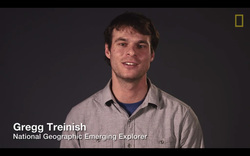ASC Executive Director Gregg Treinish recently presented to the National Geographic Explorers Symposium about the emerging environmental issue of microplastic pollution, and about the ASC Microplastics Project.
Thousands of tiny plastic particles can be released every time we wash synthetic clothing, he explained. While all clothing items including cotton and wool shed microfibers, natural fibers biodegrade, and synthetic particles do not. They attract and absorb toxins while traveling through the waterways, and when the particles are accidentally eaten by small aquatic organisms, the toxins enter the food chain.
Watch a video of Gregg at the Explorers Symposium:
In the past two and a half years, ASC sailors, surfers, divers and other adventurers have gathered hundreds of ocean water samples. We’ve found microplastic pollution in nearly every sample, and from some of the most remote ocean environments on Earth.
With that information, we expanded our research to freshwater. Hikers and paddlers worldwide are now gathering samples from rivers, lakes and streams. Once we’ve compiled enough data, ASC will work with government, corporate and educational partners to instigate a reduction in microplastic pollution.
What can you do to help?
- Don’t buy products with microbeads. Here is a list of products to avoid.
- Wash your fleece and other synthetic items less.
- Consider buying a filter for your washing machine.
- Use less plastic, starting with cloth grocery bags. It’s simple supply and demand.
- Support a microbead ban in your state.
- Talk to your friends and family; informed citizens make better decisions.
- Join the ASC Microplastics Project.

